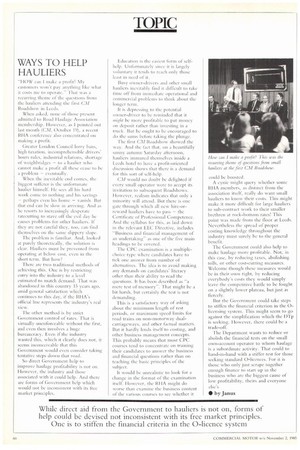WAYS TO HELP HAULIERS
Page 62

If you've noticed an error in this article please click here to report it so we can fix it.
-1-lOW can I make a profit? My customers won't pay illything like what it costs Inc to operate." "lhat was a recurring theme of the questiolis from the hauliers attending the first CM Roadshow iii Leeds.
When asked, none or those present admitted to Road flaulage Association membership. However, :15 I pointed out last month (CM, October 19), a recent RHA conference also concentrated on making a profit.
Greater London Council lorry bans, high taxation, incomprehensible drivers' hours rules, industrial relations, shortage of weighbridges — to a haulier who cannot make a profit all these cease to be a problem — eventually.
When die inevitable end conies, the biggest sufferer is the unfortunate haulier himself: He sees all his hard work come to nothing and his savings — perhaps even his home — vanish. But that end can be slow in arriving. And as he resorts to increasingly desperate ratecutting to suave off the evil day he causes problems for other hauliers. If they are not careful they, too, can find themselves on the same slippery slope.
The problem is familiar. And, looked at purely theoretically, the solution is clear. Hauliers must be prevented ti-om operating at below cost, even in the short term. But how?
There are two traditional methods of achieving this. One is by restricting entry into the industry to a level estimated to match demand. That was abandoned in this country 15 years ago, amid general satisfaction which continues to this day, if the RHA's official line represents the industry's real view.
The other method is by strict Government control of rates. That is virtually unenforceable without the first, and even then involves a huge bureaucracy. Even if the industry wanted this, which it clearly does not, it seems inconceivable that this Government would even consider taking tentative steps down that road.
So direct Government help to improve haulage profitability is not on. However, the industry and those associated with it could help. And there are forms of Government help which would not be inconsistent with its free market principles. Education is the easiest form of selfhelp. UntOrtunately since it is largely voluntary it tends to reach only those least in need of it.
Busy owner-drivers and other small hauliers inevitably rind it difficult to take time off from immediate operational and commerciai problems to think about the longer tern.
It is depressing to the potential owner-driver to be reminded that it mighr he more profitable to put money On deposit rather than investing in a truck, But he ought to be encouraged to do the sums before taking the plunge.
The first C.11 Roadshow showed the way. And the fact that, on a beautifully sunny autumn Saturday afternoon, hauliers immured themselves inside a Leeds hotel to have a profit-oriented discussion shows that there is a demand for this sort of self-help.
Clif would no doubt be delighted if every small operator were to accept its invitation to subsequent Roadshows. However, realism indicates that only a minority will attend. But there is one gate through which all new hire-orreward hauliers have to pass — the Certificate of Professional Competence. And the syllabus 1-br this, as laid down in the relevant EEC Directive, includes 'Business and financial management of an undertakingas one of the five main headings to be covered.
The CPC examination is a multiplechoice type where candidates have to tick one answer from number of alternatives. The idea is to avoid making any demands on candidates' literacy other than their ability to read the questions. It has been described as "a mere test of memory-. That might he a bit harsh, but certainly the test is not demanding.
Thus is a satisfactory way of asking about the minimum length of rest periods, or maximum speed limits for road trains on non-motorway dualcarriageways, and other factual matters. But it hardly lends itself to costing, and other business management concepts. This probably means that most CPC courses tend to concentrate on training their candidates to answer the business and financial questions rather than on teaching the basic principles of the subject.
It would be unrealistic to look for a change in the format of the examination itself However. the RI IA might do worse than examine the business content of the various courses to see whether it
could be boosted.
A cynic might query whether some RHA members, as distinct from the association itself, really do want small hauliers to know their costs. This might make it more difficult for large hauliers to sub-contract work to their smaller brethren at rock-bottom rates! This point was made from the floor at Leeds. Nevertheless the spread of proper costing knowledge throughout the industry must surely he to the general benefit.
The Government could also help to make haulage more profitable. Not, in this case, by reducing taxes, abolishing tolls, or other cost-cutting measures. Welcome though these measures would be in their own right, by reducing everybody's costs they would simply leave the competitive battle to be fought on a slightly lower plateau, but just as fiercely.
But the Government could take steps to stiffen the financial criterion in the 0licensing system. This might seem to go against the simplification which the DTp is seeking. However, there could be a trade-off.
The Department wants to reduce or abolish the financial tests on the small own-account operator to whom haulage is a subordinate activity. That could to hand-in-hand with a stiffer test for those seeking standard 0-licences. For it is those who only just scrape together enough finance to start up in the business who are the biggest cause of low profitability, theirs and everyone else's
• by Janus












































































































